When you’re a kid, one of the surest signs of summer is hearing the happy sound of the ice cream truck crawling through the neighborhood. You don’t worry about how that magical truck is keeping the ice cream cold, only that it rolls down your street, and that the stars align and your parents give you money for a giant ice cream-cookie sandwich with the edge rolled in tiny chocolate chips.
In the early days of mobile refrigeration, ice cream trucks and other food delivery vehicles relied first on ice, and then dry ice to keep perishables cold. Someone eventually invented an electric cooling system, but those had to be recharged periodically at power stations. There was also a short-lived mechanical system, but it was highly susceptible to road vibrations.
Until Frederick McKinley Jones came along, mobile refrigeration was fledgling, and sources of perishable food were extremely localized and limited. In the early 1940s, Frederick patented the first practical automated refrigeration system for trucks, and it revolutionized the shipping and storage of food and medicine.
A Cold Childhood
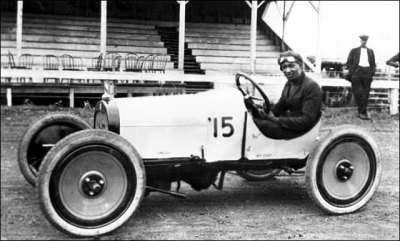
Frederick McKinley Jones had what most would consider a rough start to life. He was born in 1893 to a Black mother and an Irish father in Cincinnati, OH. Frederick’s mother abandoned him when he was a baby, and his father struggled to raise him alone.
When no orphanage would accept the seven-year-old Frederick, his father sent him to live with a Catholic priest across the river in Kentucky. Two years later, his father died.
Little Fred was a tinkerer from the start, and loved to play around with his father’s pocket watch. The priest encouraged Fred’s interest in mechanics, and let him fix the congregation members’ cars while they sat through the church services.
Fred lived with the priest until he was eleven, when he quit school and ran away, back across the river to Cincinnati. He found work as a janitor in a garage, and by the age of fourteen had worked his way up to mechanic and started building race cars for his boss. Within a year or two, the boss fired him for racing cars when he was on the clock.
Handyman Fred
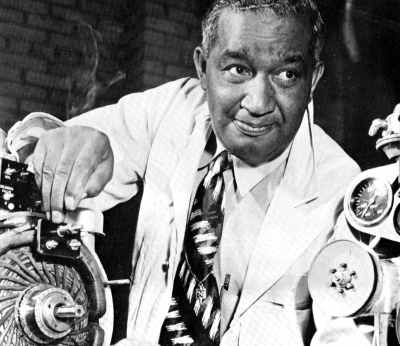
After that, Fred moved around a bit and took odd jobs to support himself. One night he offered to fix the boiler at a hotel in exchange for a room and a few meals, though he had no experience with boilers or the required tools. Fred did such a good job that the hotel owner offered him a job as a mechanic on his family’s large farm in Hallock, Minnesota. Fred packed his bags and moved once again.
The farm proved to be a great opportunity for Fred. An engineer working there helped him study and eventually earn his engineering license. Soon after, Fred was called up to fight in WWI. Once the officers saw what he was capable of, Fred’s mechanical skills were soon in great demand, and he was asked to work on all kinds of equipment and vehicles. Within a short time, Fred was promoted to sergeant.
When the war was over, Fred went back to the farm in Hallock. He taught himself new skills like electronics in his spare time by reading library books and taking mail order courses. Fred quickly became known around the town as a handyman and problem solver, and built many things for the town over the years, including a transmitter for the town’s first radio station.
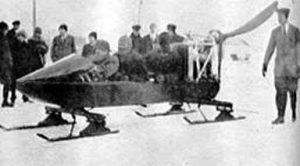
After one of town doctors complained about having to wheel patients down to the x-ray equipment all the time, Fred built a portable x-ray machine. He also built what is arguably the first snowmobile by slapping skis to an airplane fuselage and adding a propeller on the back. The purpose? Helping doctors get around in the snow to make house calls.
When talkie pictures came along and Hallock’s only theater couldn’t afford to upgrade their equipment, Fred built a machine that could synchronize film and sound. This invention caught the attention of a film industry businessman from Minneapolis named Joseph Numero, who hired him in 1930.
The King of Cool
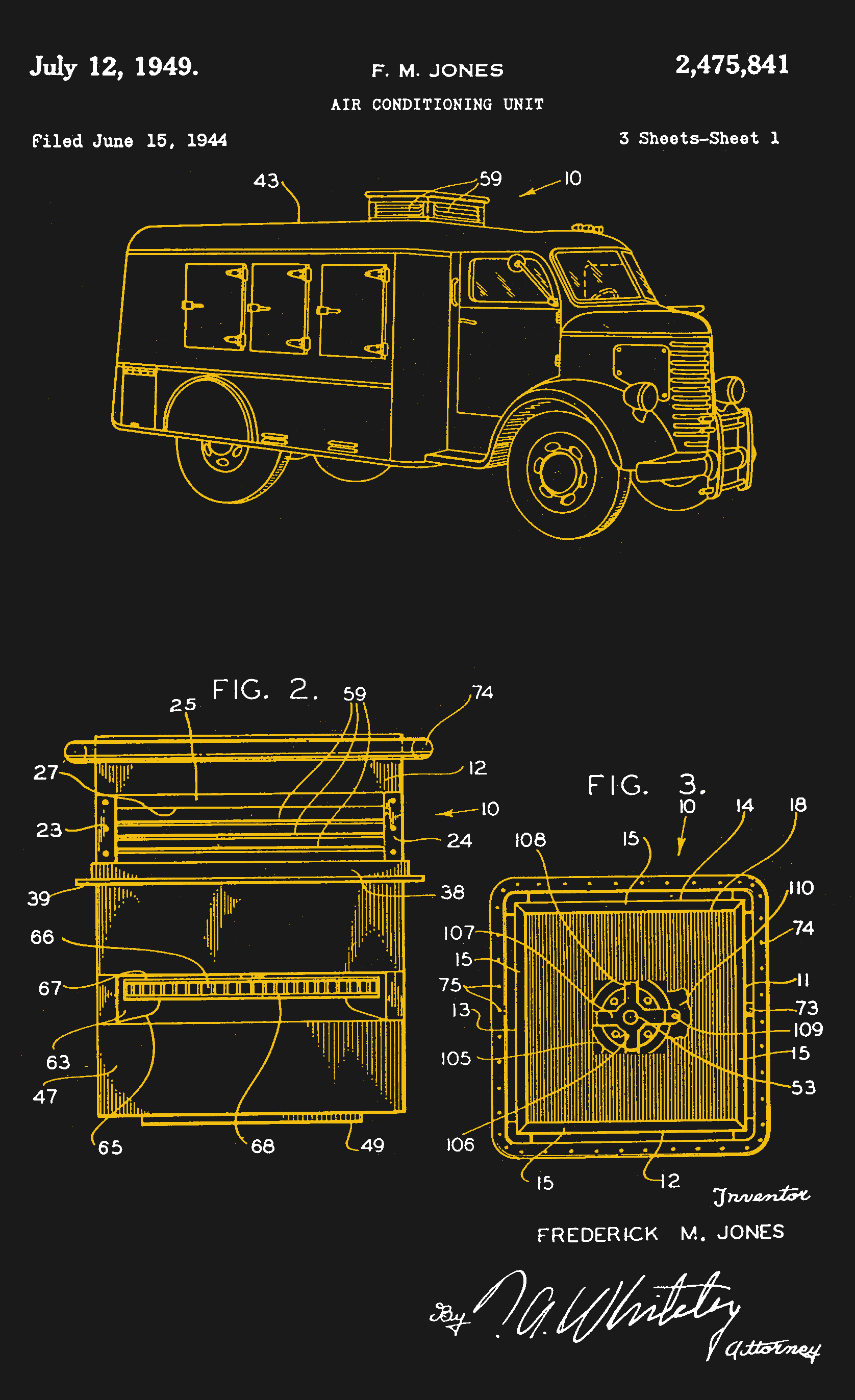
But the problem that would define Fred’s legacy came about as an offhand comment. One of Numero’s golf buddies complained to him about a poultry truck that got stuck overnight. All the ice melted, and the entire shipment was ruined. Numero was only recounting the story to Fred, but he took the problem seriously anyway.
The problem was twofold; vehicles lacked the power necessary to run a refrigeration system, and the vibrations present in automotive applications made existing refrigeration unfeasible.
Fred’s approach was to invent a single unit for installation in the roof of any enclosure, made up of the cooling unit and the motor to drive it. This made it both compact and simple to repair. The use of a dedicated engine solved the power issue, and by using a thermostatically controlled motor (for which he was issued a patent) the refrigeration unit was automatic. With Fred’s solution in hand, Numero quit the film industry so that the two could go into the refrigeration business together. They started the US Thermo Control Company, later called Thermo King.
Fred’s invention arrived in time to be of great service in WWII. The US Department of Defense chose one of Fred’s mobile refrigeration units for use throughout the armed forces, and they cropped up everywhere from B-29 cockpits to field hospitals. The idea was soon expanded to planes and boxcars, and the cold transport chain that we all greatly benefit from today was born.
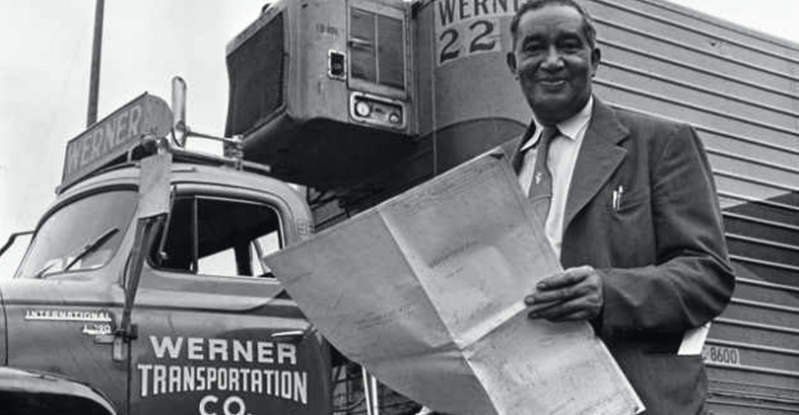
Illness forced Fred to retire from Thermo King in the late 1950s, and he died of lung cancer in 1961. He was the first African-American to receive the National Medal of Technology, which he was posthumously awarded in 1991.
Frederick Jones hasn’t gotten all the credit he deserved throughout the years for a couple of reasons. He failed to apply for patents on his earlier inventions. But also, he was a half Black man inventing things in the early American 20th century. Everywhere he went, people doubted his abilities, but they usually thawed out once they saw what he was capable of. Fred was a self-made man, and it’s clear that he always took his own advice: be willing to work, be willing to read and study to enrich your life, and always believe in yourself.











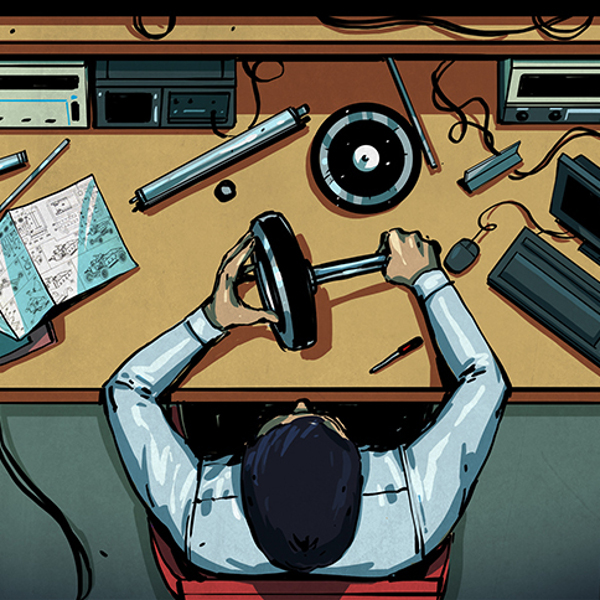





This is a wonderful post about a man who should be better known, thank you for writing it! I do have one objection. As an African American from a family of tinkerers, inventors, and now three generations of engineers, the notion that Frederick Jones was a “half Black man” is, in my mind, a bit of revisionist history. All of his life he would have been called black, negro, colored, or a few other terms I needn’t add. Nearly all African Americans who are descended from slaves have some percentage of white blood, in some cases (like some in my extended family) well over half. His having a white father would not have allowed him to use white only facilities, or allowed him to avoid the petty day to day harassment (and occasional violence) that any other Black person at the time experienced. I am thankful that we can now be a bit more open about the mix of racial backgrounds that are common in this country, but I really don’t think we should apply current thinking to the reality that Frederick Jones lived with his entire life.
He might depending upon how much of his color came through. There have been many that at first glance one wouldn’t have known if they were colored.
I’m sure you mean well with this comment, but you don’t seem to know what it was like back then. There are pictures of him above, there is no way he would have been mistaken for white. His background was not unusual, he would have treated him like any other Black person at the time. Understand that the notion of “whiteness” was fungible, much of the white background in my family came through intermarriage with Irish and southern/eastern European immigrants brought in to replace slaves (as many Blacks refused to work for their former masters) after the Civil War, they were not considered “white” until the 20th century.
When one of my relatives by marriage on my mother’s side of the family came to the USA from Egypt, he was told he should sign up for welfare and all the other stuff handed out by the government. But at the time there was no option for Egyptian so he didn’t do any of that. He’s always said that was the best thing that happened to him then, he had to work to support himself 100%. He’d gone to school in Egypt to learn chemistry. If he’d graduated the Egyptian government wouldn’t let him leave. So right before final exams he went on “vacation” to Europe where some friends got him on his way to the USA.
One of his early jobs was cleaning the inside of sugar silos, knocking the sugar crust loose while hanging from a rope. When the company found out he had an all but the diploma degree in chemistry, they switched him to a much better job. Worked there until he retired, then continued as a consultant for quite a while.
Look up Samuel R. Delany. Looks very Caucasian, except for his nose. Haven’t been able to find pictures or much of anything about his parents.
Thank you for this. One of my favorite stories that I use to annoy students (from all over the world now) is Norbert Rillieux and his trajectory from French citizen to Louisianan and onward back to Paris because of his poor treatment. Just one of the first chemical engineers of the world who saved the US sugar industry (and had a lot to do with keeping New Orleans dry-ish).
Anyone involved in developing refrigeration/air conditioning technology deserves a statue in every city as far as I’m concerned. I’m not even joking. Every time I hear my air conditioner turn on I breathe a prayer of thanks to God Almighty for blessing mankind with the technology. Next time I crack open a tub of Bluebell Homemade Vanilla Bean ice cream I will speak a blessing on the memory of Fredrick Jones.
Right with you! I am glad I learned about Mr. Jones today.
There is a statue of Dr. John Gorrie, one of the “fathers of refrigeration” (there were many) in Appalachiacola, Florida where he developed his air-compression refrigeration system to fight malaria (thought to be caused by bad air rather than the critters that fly in it- thus “mala aria”) because the cost of ice was so high.
“He taught himself new skills like electronics in his spare time by reading library books and taking mail order courses. ”
Amazing what one can do without an internet. ;-)
Genius doesn’t need the internet, just opportunity and Mr. Jones also seemed to be genius am making his own opportunity.
Encyclopedias used to be really useful, with enough info for experimenters and tinkerers to figure out how to build and make a lot of things. Later on they became pretty much a “highlight reel”. Compare a late 70’s and later World Book or Britannica to editions from the 1930’s or earlier. Britannica ceased publishing a print edition in 2012. World Book still has a print edition, nearly all of which are sold to schools.
True, the internet, is great place to learn, but it also a place where ignorance spreads. In this man’s day, and today still, technical printed on paper, was/is generally quality controlled When I can, I direct newcomers,to learning material developed by military agencies. Electronics Technical Series for example, Much of the US military manuals have been digitized, and ar available for free, fom places like archive.org in multiple formats.
Of course, mention of the internet is a present day thing.
He scrounged information, which wasn’t uncommon back then.
I don’t think the internet teaches. It may supply raw information, the same way I’d buy used books to get things. The illusion is that for many, they can pull instructions off the internet for doing all kinds of things, less effort required to find them, no actual skill needed to follow them.
Just because everyone uses s cellphones, “technology”, diesn’t mean they are skilled in knowing how it works. And just because someone can follow instructions off the internet to fix their iPhone screen doesn’t mean they can troubleshoot and repair in general.
I would have enjoyed a better tale on why shaking (float valve?) was a problem and weather the unit was gas motor to electric gen to run that brushed motor I see in the photo, with the thermo switch leaving the generator set to idle away till needed.
You might want to read the patent applications that have an extensive description of the system.
As someone with no background in refrigeration units – I’ve no idea even what the float valve mentioned above is, and I was completely unaware that there was a problem with automotive refrigeration – I’d have appreciated if a HaD editor had explained the problem and solution in terms a software guy could understand.
Otherwise great article, enjoyed reading it!
The patent – if I read it right – seems to suggest the issue was convection cooling the motor, something to do with wind?
One of the most positive articles on Hackaday for a while ..Good one!
A good read, thanks. Now, when I see a refrigerated truck, sea container, etc, I will think of Fred.
Like just about every story of somebody that become a significant technical person – it all starts not with how much money the parents had, where they came from or what color they are but as a child they tinkered away with things, pulled things apart.
the Thermo King units kept our 1 day old turkeys at 35C on the trip from New South Wales to South Australia
one of my truck driver mates told me the “refrigerated” trucks in the northern hemisphere use the thermo king unit to stop fresh produce from freezing in winter
he does the trip from Adelaide to Perth twice a week, on a few occasions his prime mover had the alternator fail, there is a cable from the Thermo King unit that can power the rig
When I hear ice truck, immediately comes to mind Richard and his truck:
https://en.wikipedia.org/wiki/Richard_Kuklinski
I know, something is wrong with me, but nothing that i scream can’t cure.
What?
No love for Clarence Birdseye?
Birdseye didn’t innovate in mobile freezing/refrigeration.
+1 for World Book. My mother was a casual World Book seller, so we had the 1964 edition in the house (also the Childcraft series).
World Book from then contained recipes^W articles about gunpowder, nitroglycerine, and many other interesting compounds and mixtures.
As my school classmates found out, once I’d got the technique down pat.
Personally I wouldn’t characterize refrigerated food ass fresh food year round. There’s an old boy at 40 North in Nebraska, who produces fresh food year round, in a hybrid green house design.
https://www.youtube.com/watch?v=ZD_3_gsgsnk
In the eent I had purchase the entire 80 acre here years ago, would build such a green house. Hoever my reality changed, an can no longer do such projects.